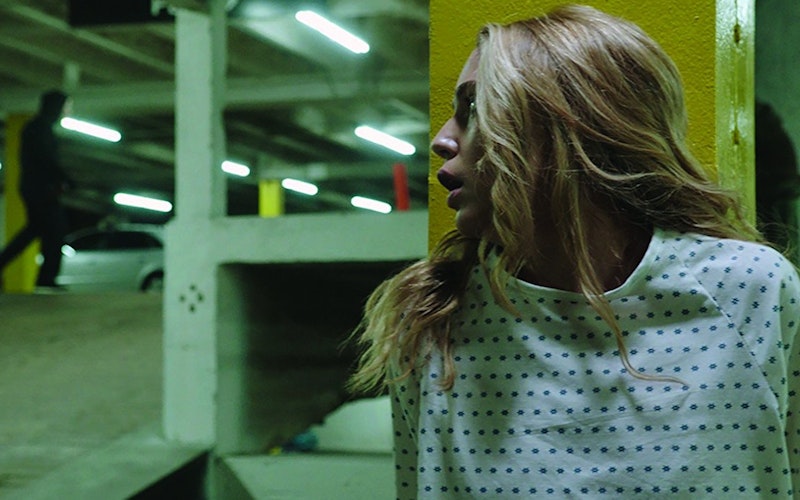
Movies
Happy Death Day’s Scars of Redemption
Despite its slasher trappings, Happy Death Day is more fantasy film than horror flick. Sure, some viewers might jump when an attacker in a baby mask kills medical student Tree Gelbman (Jessica Rothe) after her late-night birthday party. But when the scene cuts to Tree back in her bed, beginning anew the day that just ended, we know we’re in the realm of wish-fulfillment. Happy Death Day doesn’t want to scare us as much as it wants to indulge the fantasy of a do-over, a second shot at a day (or life) gone wrong.
Before getting caught in her time loop, Tree lived according to her own inclinations, with no regard for others. Rothe gives a comically rich performance as a sneering sorority girl who belittles low-status classmates and launches materialistic machinations against her head sister. She fully embodies the party girl archetype that was parodied in Mean Girls and offed in Friday the 13th.
Director Christopher Landon, working from a script by Scott Lobdell, transplants this character type into a structure cribbed from Groundhog Day (which Happy Death Day explicitly acknowledges). Like Bill Murray’s Phil Connors, the narcissistic Tree evolves into a caring person by reliving the same day and learning from her mistakes. Or, more accurately, she becomes a caring person by learning that she has treated many people very badly.
Fearing that others may be doing unto her as she’s done to them, Tree spends much of the film mistrusting even the most benign interactions. When one of her professors (Charles Aitken) performs a medical examination on her, he projects genuine empathy, dispensing advice and offering to buy snacks. But given that Tree happens to be having an affair with him, she worries that his wife (or perhaps the professor himself, should he be looking for a way out) may be trying to eliminate her. Landon and cinematographer Toby Oliver saturate the hospital in putrid green during this scene, while the camera conveys Tree’s paranoia by following behind her as she searches the facility for signs of ill intent. The implication is that her behavior has tainted an otherwise safe space.
Christianity is a religion of scars.
It’s during this sequence that the movie adds a wrinkle to its time-loop structure. The medical tests reveal contusions on Tree’s brain and scars on her body—remnants of the violence she has suffered in earlier versions of the repeated day. When Tree wakes up, she’s sore from being hit by a truck or has lungs full of the water in which she just drowned. Though she’s alive again, her “deaths” still leave marks.
Sometimes, as Christians, we think of forgiveness as a complete do-over. When we read that our sins “shall be as white as snow,” we hope this means that it will be as if our transgressions were never committed. But Christianity is a religion of scars. In Jeremiah, God says this of Israel’s sin: “Your wound is incurable, your injury beyond healing.” And while in that same passage he promises to “restore you to health and heal your wounds,” God also insists that actions have consequences. As with the Israelites wandering in the desert or David losing his son, the effects of our violations linger, even if the price of our sin is paid.
God’s grace may not erase scars, but it does redeem them. In the same way that Christ’s wounds are a testament to what he endured for us, so also do the scars of our shortcomings remind us of God’s salvation. Paul’s epistles demonstrate this when he declares that God’s power is made perfect in weakness. If Paul was, perhaps, still tormented by the persecution he enacted as Saul of Tarsus, he nonetheless knew that God’s grace is sufficient even for him. Paul boasted about his weaknesses because they pointed to Christ’s salvation.
By the time Happy Death Day reaches its third act, Tree thinks of her scars in a similar manner. (Spoilers ahead.) When one version of the repeated day ends with her killer thwarted but her friend Carter (Israel Broussard) dead, Tree hangs herself to restart the day again. She wakes up with bruises on her neck, but the hug she shares with Carter transforms those wounds from a consequence of her death to a reminder of her friend’s life. Past failures, however painful, give her existence more meaning than an empty do-over could ever offer.
The Bible never promises the do-over fantasy. It teaches that forsaking God’s design in favor of our own inclinations necessarily ends in wounds. Sometimes scars remain even after his healing. But the Bible also teaches that for those in Christ, scars ultimately indicate not failure but forgiveness, a redemption that transforms signs of sin into evidence of God’s unfailing love.
Topics: Movies, Culture At Large, Arts & Leisure